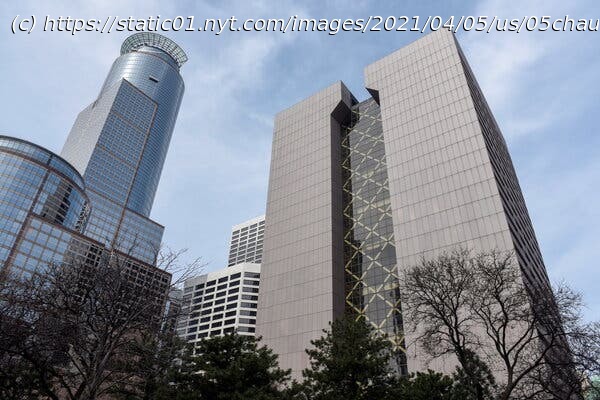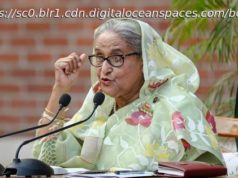Mr. Chauvin, a former Minneapolis police officer, faces charges of manslaughter, second-degree murder and third-degree murder in the death of George Floyd.
Mr. Chauvin, a former Minneapolis police officer, faces charges of manslaughter, second-degree murder and third-degree murder in the death of George Floyd. transcript “So your job, if you are to be selected as a juror in this case, would be to hear all of the evidence in this case. Do you understand that? Is that a yes?” “Yes.” “You don’t have to check in with the jury office or anything like that. If you have your yellow lanyard and the letter, do you have the letter with the number on it?” “Yes.” “Yeah, I’ll just take that. You can leave it on the stand there and — right, and then you can go with the deputy. Thank you for taking the time to fill out the questionnaire and to be here today.” “Thank you.” “Thank you.” “You’ve not seen any of the social media videos or news stories with clips of the video or anything?” “No.” “OK.” “I’ve seen the still, there’s a still image that was pretty common, but that’s the most I’ve seen.” “OK, thank you for that clarification. But based on your observation of that still photo, you formed an opinion about what was happening in that instant, right?” “I wouldn’t attribute that to the photo. I’d attribute that to news that was circulating at the time.” “OK.” The death of George Floyd drew widespread outrage last May after a video circulated online showing Officer Derek Chauvin holding his knee on Mr. Floyd’s neck on a Minneapolis street corner as he gasped for breath. Mr. Floyd’s death spurred nationwide protests over police brutality and a reckoning over everything from public monuments to sports team names. Now the case will finally be litigated in criminal court, with Mr. Chauvin set to go on trial this month to face charges of manslaughter, second-degree murder and third-degree murder. Here’s what to know about the case. The jury for the murder trial of Derek Chauvin in the death of George Floyd has been seated, clearing the way for the opening arguments in the trial, set to begin on Monday. The 12-member jury includes two white men, four white women, three Black men, one Black women and two women who identify as mixed race, according to information provided by the court. Two white women and a white man are the alternates. Mr. Floyd’s death in Minneapolis, captured on video that showed him pinned under Mr. Chauvin’s knee for more than nine minutes, set off months of protests across the country against police brutality and for racial equality, the largest mass movement for civil rights since the 1960s. The racial makeup of the jury was closely watched. Mr. Chauvin is white and Mr. Floyd was Black. The pool of potential jurors in Hennepin County is whiter than the population of Minneapolis and has grown more so during the pandemic. But the jury will be more diverse than Minneapolis, which is 20 percent Black. The Minnesota Rules of Criminal Procedure say that the alternates will be the last three jurors chosen, two white women and a white man in his 20s who was questioned on Tuesday. Only two of them will be seated when the trial begins. Like many of the jurors, the man chosen on Tuesday said he had a “somewhat negative” opinion of Mr. Chauvin after seeing parts of the video of Mr. Floyd’s treatment in police custody. But he added that he did not support defunding the police and believed the police helped keep him safe. From the start, many worried that it would be impossible to seat an impartial jury in Minneapolis for a case that provoked wide-scale unrest and reverberated around the world. Prospective jurors were asked about answers they provided on a 14-page questionnaire that asked their views on a wide range of topics including Black Lives Matter, Blue Lives Matter and whether the criminal justice system is racially discriminatory. Those who expressed opinions said they could set them aside and rule according to the evidence presented at trial. Jury selection was set to take three weeks, and jurors that had already been chosen had to be called back and questioned again after the city announced a $27 million settlement with Mr. Floyd’s estate. Despite that delay, jury selection ended several days ahead of schedule. — Shaila Dewan transcript The purpose of a change of venue is to ensure that the defendant has a fair trial by an impartial jury. The same is true of, as the basis for the defense’s latest motion to continue with the hope that as time passes, people forget some of the pretrial publicity. Unfortunately, I think the pretrial publicity in this case will continue no matter how long we continue it. And as far as change of venue…… I do not think that would give the defendant any kind of a fair trial beyond what we are doing here today. I don’t think there’s any place in the state of Minnesota that has not been subjected to extreme amounts of publicity on this case. The murder trial of Derek Chauvin, the former police officer charged in the death of George Floyd, will start on time and remain in Minneapolis. Judge Peter A. Cahill of Hennepin County District Court on Friday ruled against motions by Mr. Chauvin’s lawyer for a continuance and change of venue, setting the stage for opening statements to begin March 29. Eric J. Nelson, Mr. Chauvin’s attorney, argued that the huge pretrial publicity of the case, including the news of the settlement last week between the city of Minneapolis and the Floyd family for $27 million, had prejudiced the jury pool. Yet even as some jurors have said the payout influenced their opinion about Mr. Chauvin’s guilt and that they could not be fair and impartial, other jurors have said they could set aside what they have learned about the case in the news media and be fair. Judge Cahill said that there is no place in Minnesota that has not been saturated with media coverage of the case, and that a delay would not reduce the intense public scrutiny of the proceedings. The judge said the basis of the defense’s motion for a delay is “the hope that as time passes, people forget some of the pretrial publicity.” He continued, “Unfortunately, I think the pretrial publicity in this case will continue no matter how long we continue it. Perhaps some of it with time might be forgotten by people. As far as change of venue, I do not think that would give the defendant any kind of a fair trial beyond what we are doing here today. I don’t think there’s any place in the state of Minnesota that has not been subjected to extreme amounts of publicity on this case.” The timing of the civil settlement has angered Judge Cahill — who had to dismiss two jurors who had already been seated, because they said the settlement changed their view on the case — but nevertheless jury selection has moved quickly. On Thursday, three more jurors were added to the panel, bringing to the total to 12. The court now only needs to add two alternates to complete the jury, and more people were summoned on Friday to answer questions. The 12-person jury is a diverse panel that includes seven women and five men. There are four Black jurors, six white people and two people who identify as multiracial. In a separate ruling on Friday, Judge Cahill reversed himself and said the defense could bring up at trial details of an arrest of Mr. Floyd by Minneapolis police in May 2019, almost one year before his death. The 2019 incident, the defense has argued, is remarkably similar to the circumstances before Mr. Floyd died after being pressed to the concrete for more than nine minutes under Mr. Chauvin’s knee, as he gasped for breath. In both cases, Mr.






